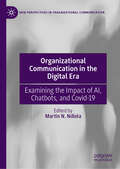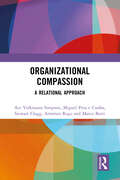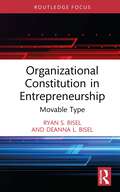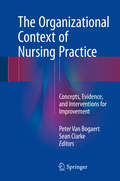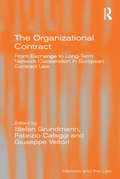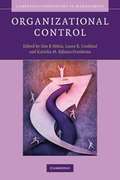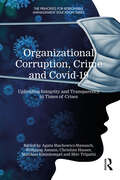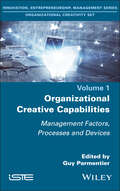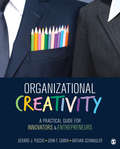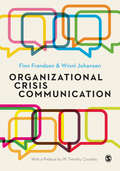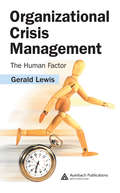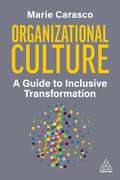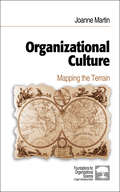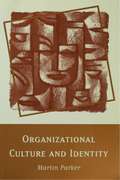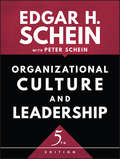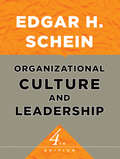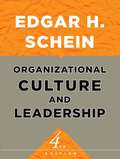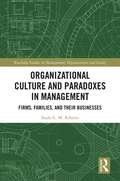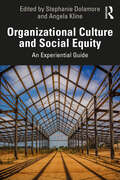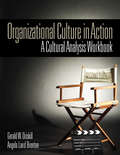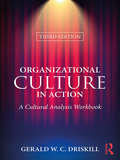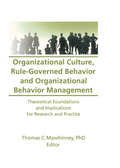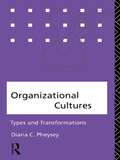- Table View
- List View
Organizational Communication in the Digital Era: Examining the Impact of AI, Chatbots, and Covid-19 (New Perspectives in Organizational Communication)
by Martin N. NdlelaThis edited collection examines different facets of organizational communication in the context of current technological developments and disruptions brought about by the COVID-19 pandemic. AI is making inroads in organizational communication practice, influencing how organizations communicate and interact with their environments. It drives, augments and supplements organizational communication. Chatbots, for example, are becoming increasingly relied upon by organizations, using them to manage basic communication tasks that used to belong solidly to the realm of human. Similarly, developments such as ChatGPT have attracted scholarly attention due to their perceived implications on various aspects of communication. All of this has a profound effect on human interactions and relationships in organizational settings. Filling a gap in scholarship around organizational communication in light of ongoing digital transformation processes and COVID-19 induced transformations, chapters provide an up-to-date account of how new communication technologies, especially AI, are transforming organizational communication. The contributions reflect upon the most current theory and practice in the field in the post-COVID era. Combining theory, applied scholarship and fresh case studies, this is a valuable resource that reflects on the new realities of today’s organizational environment.
Organizational Compassion: A Relational Approach
by Ace Volkmann Simpson Miguel Pina Cunha Stewart Clegg Arménio Rego Marco BertiOrganizational compassion provides a multitude of benefits at individual, team and organizational levels. These encompass heightened positive affect, trust, engagement, loyalty, performance, resilience, and recovery. This important book provides an accessible yet scholarly overview of key academic findings and theories on organizational compassion. It equips readers with tools for reflection, awakening and practical application of compassion within the workplace across dyadic, team and organizational contexts. Historically, compassion work has been largely unacknowledged in official organizational discourse. Yet, wherever there are human beings, there will be suffering; where there is human suffering, one can often find human responses infused with kindness and compassion. This observation holds true across industries, professions, and communities. The book explores the complexities of organizational compassion, analyzing the factors that enhance organizational compassion capabilities, as well as those that make compassion falter and fail. The primary aim of this book is to foster the cultivation of organizational compassion by providing a provocative, stimulating and engaging foray into the academic study of organizational compassion for readers, ranging from undergraduate to postgraduate and executive students, as well as reflective practitioners. In a world marked by suffering and challenges, a research-based understanding and fostering of compassion at work, offers a path towards a better future.
Organizational Constitution in Entrepreneurship: Movable Type (Routledge Studies in Communication, Organization, and Organizing)
by Ryan S. Bisel Deanna L. BiselThis book presents the seven entrepreneurial activities (SEA) model of new organizational constitution, a prescriptive extension of the four flows model tradition of communicative constitution of organizations (CCO) theory. Organizational Constitution in Entrepreneurship explains the SEA model in detail, illustrating it with autobiographical accounts from Deanna Bisel’s years of experience as an entrepreneur. The volume explores how entrepreneurial efforts to create and maintain organizations involve interrelated activities. In doing so, it offers a vision of new organizational creation and maintenance as (a) communicative and material, (b) initiated by value propositions, (c) difficult to achieve, (d) having periods of partiality, (e) being the result of constitutive leadership distributed among members, and (f) dependent upon constitutive momentum generated in organizational learning. This unique volume will be a key reference for students and scholars of organizational communication, management, business studies, entrepreneurship, and communication studies.
The Organizational Context of Nursing Practice
by Peter Van Bogaert Sean ClarkeThis book explores the various features of work environments that affect nurses' experiences of their work, their interactions with co-workers and patients, and ultimately health care quality and patient outcomes. Using a broad and comprehensive approach, the authors identify the most extensively researched and best-understood concepts in the field and presents a critical and up-to-date review of the evidence regarding causes and effects of work environment features. It then presents evidence regarding organizational interventions aimed at broad ranges of clinical practices and outcomes, such as team-based interventions and management practices to improve practice climate. The ideas, approaches, and evidence are presented by a team of researchers and experienced practitioner/leaders; taken together, they form a state-of-the-science toolkit. Unique features of this book include a systematic presentation of best practices in nursing and healthcare leadership, along with the conceptual grounding and empirical support for these approaches, and extensive demonstrations of how these practices, many of which originated in North America, apply to European contexts.
The Organizational Contract: From Exchange to Long-Term Network Cooperation in European Contract Law (Markets And The Law Ser.)
by Stefan Grundmann Fabrizio CafaggiThis book introduces and develops the paradigm of the organisational contract in European contract law. Suggesting that a more radical distinction should be made between contracts which regulate single or spot exchanges and contracts that organize complex economic activities without creating a new legal entity, the book argues that this distinction goes beyond that between spot and relational contracts because it focuses on the organizational dimension of contracting and its governance features. Divided into six parts, the volume brings together a group of internationally renowned experts to examine the structure of long-term contractual cooperation; networks of contracts; knowledge exchange in long-term contractual cooperation; remedies and specific governance rules in long-term relationships; and the move towards legislation. The book will be of value to academics and researchers in the areas of private law, economic theory and sociology of law, and organizational theory. It will also be a useful resource for practitioners working in international contract law and international business transaction law.
Organizational Control
by Sim B Sitkin Laura B. Cardinal Katinka M. Bijlsma-FrankemaOrganization scholars have long acknowledged that control processes are integral to the way in which organizations function. While control theory research spans many decades and draws on several rich traditions, theoretical limitations have kept it from generating consistent and interpretable empirical findings and from reaching consensus concerning the nature of key relationships. This book reveals how we can overcome such problems by synthesising diverse, yet complementary, streams of control research into a theoretical framework and empirical tests that more fully describe how types of control mechanisms (e. g. , the use of rules, norms, direct supervision or monitoring) aimed at particular control targets (e. g. , input, behavior, output) are applied within particular types of control systems (i. e. , market, clan, bureaucracy, integrative). Written by a team of distinguished scholars, this book not only sheds light on the long-neglected phenomenon of organizational control, it also provides important directions for future research.
Organizational Corruption, Crime and Covid-19: Upholding Integrity and Transparency in Times of Crises (The Principles for Responsible Management Education Series)
by Agata Stachowicz-StanuschCorruption often flourishes in times of uncertainty and crisis. When institutions and oversight are weak, and public trust low, corruption can thrive and undermine how societies respond to the crisis. Covid-19 brought this issue into sharp focus, and this book uncovers some of the problems experienced across the globe and, crucially, explains how organizations and countries can strengthen their anti-corruption systems to prevent problems in the future.The book has been created by the members of the United Nations Principles for Responsible Management Education group on anti-corruption and brings together top international experts to consolidate the lessons from the Covid-19 crisis in order to improve transparency, integrity, trust, and governance in the future. Cybersecurity and cybercrime related to the pandemic are a particular focus. These factors are essential to social and economic order. Practice-oriented, each chapter offers examples of methods, approaches, tools, and cases which can be used for anti-corruption teaching, policy, and corporate initiatives.With insights and cases from right across the globe, the book will be of interest to NGOs, policymakers, organizational leaders, students, and researchers looking to foster accountability, integrity, and transparency across organizations in times of crisis.
Organizational Creative Capabilities: Management Factors, Processes and Devices
by Guy ParmentierCreativity, whether individual or collective, is often approached without taking into account organizational processes, routines and management systems. However, in today’s constantly changing world, developing creativity at all levels of an organization is the key to developing a continuous flow of innovation and solving complex problems in order to achieve set goals. Organizational Creative Capabilities presents a comprehensive approach to creativity, with a view towards building a genuine organizational capability with the potential to deliver strategic advantages. The book provides an understanding of organizational creative capabilities through methods of openness, slack, socialization, agility, equipment and idea management. It provides keys and examples for developing recurrent, value-creating creativity, and also addresses the question of measuring the performance of creative capabilities.
Organizational Creativity: A Practical Guide for Innovators & Entrepreneurs
by Gerard J. Puccio Nathan Schwagler John F. CabraReignite your creative-thinking skills to produce innovative solutions Organizational Creativity: A Practical Guide for Innovators and Entrepreneurs by Gerard J. Puccio, John F. Cabra, and Nathan Schwagler, is a compelling new text designed to transform the reader into a creative thinker and leader. Arguing that creativity is an essential skill that must be developed, the authors take a highly practical approach, providing strategies, tools, and cases to help readers hone their creative abilities. Whether students are preparing to become entrepreneurs or to work in an established firm, this text will help them survive and thrive in an era of innovation and change.
Organizational Creativity: A Practical Guide for Innovators & Entrepreneurs
by Gerard J. Puccio Nathan Schwagler John F. CabraReignite your creative-thinking skills to produce innovative solutions Organizational Creativity: A Practical Guide for Innovators and Entrepreneurs by Gerard J. Puccio, John F. Cabra, and Nathan Schwagler, is a compelling new text designed to transform the reader into a creative thinker and leader. Arguing that creativity is an essential skill that must be developed, the authors take a highly practical approach, providing strategies, tools, and cases to help readers hone their creative abilities. Whether students are preparing to become entrepreneurs or to work in an established firm, this text will help them survive and thrive in an era of innovation and change.
Organizational Crisis Communication: A Multivocal Approach
by Professor Finn Frandsen Professor Winni JohansenLecturers/Instructors - Request a free digital inspection copy here When a crisis breaks out, it’s not always just the organization that reacts - the news media, customers, employees, trade associations, politicians, activist groups, and PR experts may also respond. This book offers a new and original perspective on crisis communication based on the theory of the Rhetorical Arena and the so-called multivocal approach. According to this approach, we gain a more dynamic and complex understanding of organizational crises if we focus not only on the communication produced by the organization but also take into account the many other voices who start communicating when a crisis breaks out. It provides: An in-depth overview of the five key dimensions of organizational crises, crisis management and crisis communication A comprehensive introduction to the theory of the Rhetorical Arena and the multivocal approach to crisis communication, including some of the most important voices inside the arena A series of important international case studies and case examples in each chapter. Suitable for students studying crisis communication modules on corporate communication, public relations, and management and organization studies courses.
Organizational Crisis Communication: A Multivocal Approach
by Professor Winni Johansen Professor Finn FrandsenWhen a crisis breaks out, it's not always just the organization that reacts - the news media, customers, employees, trade associations, politicians, activist groups, and PR experts may also respond. This book offers a new and original perspective on crisis communication based on the theory of the Rhetorical Arena and the so-called multivocal approach. According to this approach, we gain a more dynamic and complex understanding of organizational crises if we focus not only on the communication produced by the organization but also take into account the many other voices who start communicating when a crisis breaks out. It provides: An in-depth overview of the five key dimensions of organizational crises, crisis management and crisis communication A comprehensive introduction to the theory of the Rhetorical Arena and the multivocal approach to crisis communication, including some of the most important voices inside the arena A series of important international case studies and case examples in each chapter. Suitable for students studying crisis communication modules on corporate communication, public relations, and management and organization studies courses.
Organizational Crisis Management: The Human Factor
by Gerald LewisOrganizational Crisis Management: The Human Factor offers theoretical background and practical strategies for responding to workplace crises. Responding to a paradigm that focuses on the operational aspects of continuity to the detriment of human factors, this volume provides a comprehensive understanding of the unavoidable yet often complex reacti
Organizational Culture: A Guide to Inclusive Transformation
by Marie CarascoDiscover how to transform company culture by embracing the interconnectedness of business and social interests to promote an inclusive workplace.Organizational Culture offers a comprehensive roadmap for transforming company culture. Using a strategic framework for navigating change, this essential guide provides business leaders and change catalysts with a holistic strategy for building a dynamic and inclusive culture. It highlights the importance of leveraging psychological principles, interpersonal dynamics, employee interest-driven initiatives and cooperative leadership to create lasting change. Featuring case studies for practical insight into how to cultivate trust and employee engagement, Organizational Culture highlights how these steps can help align Diversity, Equity, Inclusion and Belonging (DEIB) initiatives to support culture transformation. The resulting resource breaks down the best ways organizations can start engaging in inclusive culture change.
Organizational Culture: Mapping the Terrain (Foundations for Organizational Science)
by Joanne MartinExpert author Joanne Martin examines a variety of conflicting ways to study cultures in organizations, including different theoretical orientations, political ideologies (managerial, critical, and apparently neutral); methods (qualitative, quantitative, and hybrid approaches), and styles of writing about culture (ranging from traditional to postmodern and experimental). In addition, she offers a guide for those who might want to study culture themselves, addressing such issues as: What qualitative, quantitative, and hybrid methods can be used to study culture? What standards are used when reviewers evaluate these various types of research? What innovative ways of writing about culture have been introduced? And finally, what are the most important unanswered questions for future organizational culture researchers?
Organizational Culture and Identity: Unity and Division at Work
by Martin ParkerOrganizational Culture and Identity discusses the literature concerned with culture in organizations and explains why the term has been invoked with such enthusiasm. Martin Parker presents further ways of thinking about organizations and culture which suggest that organizational cultures should be seen as `fragmented unities' in which members identify themselves as collective at some times and divided at others.
Organizational Culture and Leadership
by Edgar H. Schein Peter ScheinThe book that defined the field, updated and expanded for today's organizations Organizational Culture and Leadership is the classic reference for managers and students seeking a deeper understanding of the inter-relationship of organizational culture dynamics and leadership. Author Edgar Schein is the 'father' of organizational culture, world-renowned for his expertise and research in the field; in this book, he analyzes and illustrates through cases the abstract concept of culture and shows its importance to the management of organizational change. This new fifth edition shows how culture has become a popular concept leading to a wide variety of research and implementation by various organizations and expands the focus on the role of national cultures in influencing culture dynamics, including some practical concepts for how to deal with international differences. Special emphasis is given to how the role of leadership varies with the age of the organization from founding, through mid-life to old age as the cultural issues vary at each stage. How culture change is managed at each stage and in different types of organizations is emphasized as a central concern of leader behavior.. This landmark book is considered the defining resource in the field. Drawing on a wide range of research, this fifth edition contains 25 percent new and revised material to provide the most relevant new concepts and perspectives alongside the basic culture model that has helped to define the field. Dig into assumptions and typologies to decipher organizational culture Learn how culture begins, thrives, or dies with leadership Manage cultural change effectively and appropriately Understand the leader's role in managing disparate groups The resurgence of interest in organizational culture has spurred an awakening in research, and new information is continuously coming to light. Outdated practices are being replaced by more effective methods, and the resulting shift affects organizations everywhere. Organizational Culture and Leadership is an essential resource for scholars, consultants and leaders seeking continuous improvement in the face of today's business realities.
Organizational Culture and Leadership
by Schein Edgar H.Regarded as one of the most influential management books of all time, this fourth edition of Leadership and Organizational Culture transforms the abstract concept of culture into a tool that can be used to better shape the dynamics of organization and change. This updated edition focuses on today's business realities. Edgar Schein draws on a wide range of contemporary research to redefine culture and demonstrate the crucial role leaders play in successfully applying the principles of culture to achieve their organizational goals.
Organizational Culture and Leadership (4th edition)
by Edgar H. ScheinThis updated Fourth Edition management book focuses on today's business realities. Edgar Schein draws on a wide range of contemporary research to redefine culture and demonstrate the crucial role leaders play in successfully applying the principles of culture to achieve their organizational goals.
Organizational Culture and Paradoxes in Management: Firms, Families, and Their Businesses (Routledge Studies in Management, Organizations and Society)
by Saulo C. RibeiroStudies on culture, change and social processes within organizations have been historically organized around orthogonal approaches. While the literature on change has focused on creating pragmatic, generally simple methodologies that bypass the complexity of the data in order to emphasize the possibility of intervention, literature aimed at truly understanding of the firm and its processes has emphasized the ambiguity of organization and the difficulties involved in reaching a unitary view of its processes, let alone creating a single theory of change. Finally, the literature on family businesses has been restricted to limited views of the field, disregarding the rich insights brought by psychology, sociology or anthropology. The result of these trends has been a gap in the creation of knowledge, with a paucity of studies that link theory with practice and ground change on a comprehensive view of the social reality of the firm. This book addresses both the specific need of family businesses and the broader demands of any organization in which the issue of culture is seriously considered. Drawing on the notions and scholarship on organizations and sociology, the author proposes new concepts and tools for the change agents interested in working with the instrumental rules of the firm with the cohesive tone of the family. Organizational Culture and Paradoxes in Management will be of value to students at an advanced level, academics and reflective practitioners. It addresses the topics with regard to management and organizational studies and will be of interest to organizational scholars, consultants and leaders interested in fostering a meaningful culture within organizations and family businesses.
Organizational Culture and Social Equity: An Experiential Guide
by Stephanie Dolamore and Angela KlineSocial equity, or the lack of social equity, is practiced in all of our organizations. By focusing on advancing social equity in organizational culture, public and non-profit organizations can create more inclusive operations, correct historical injustices, and fulfill their mission to serve the community. Social equity is often explored as a grand theory, but it is critical for organizations to identify and practice strategies to apply theory into action. Organizational Culture and Social Equity: An Experiential Guide is the first book of its kind to provide the public service-minded reader with an opportunity to practice social equity. The chapters are designed to be both theoretical and practical, helping the reader develop knowledge to analyze social equity efforts in their own organization as well as the tools to act. The contributing chapter authors in this book explore social equity through various dimensions of organizational culture: physical characteristics and general environment; policies, procedures, and structures; socialization; leadership behavior; rewards and recognition; discourse; and learning and performance. Each contributor provides a thorough overview of their respective culture category along with important theories and concepts, definitions, and strategies for practice. The chapter authors then examine social equity in each area of organizational culture through a learning activity, discussion questions, and a call to action. Each chapter further reinforces concepts with a vignette featuring a public administrator who has faced a situation related to that chapter. Organizational Culture and Social Equity is a timely and essential read for all those who wish to study or practice public administration through an equity lens.
Organizational Culture in Action: A Cultural Analysis Workbook
by Dr Gerald W. Driskill Dr Angela Laird BrentonThis book is a practical guide to "reading" the culture of organizations and to understanding the implications of culture for organizational effectiveness. Beginning with an explanation of the theories of organizational culture, the book provides guidance on collecting information, leading students through qualitative research methods of observation, interviewing, and analyzing written texts. Students come away equipped to apply cultural insights to fostering diversity, supporting organizational change, making leadership more dynamic, understanding the link between ethics and culture, and achieving personal growth.
Organizational Culture in Action: A Cultural Analysis Workbook
by Gerald W. DriskillOffering students and practitioners an applied approach to the subject, Organizational Culture in Action (OCA) walks them through a six-step model for analyzing an organization’s culture to provide insight into positive communication practices to improve organizational ethics and effectiveness. The authors review relevant theory while integrating a constitutive approach to studying organizational culture and communication. Practical guides for multiple data collection methods are provided, and the workbook format is full of interactive tools that engage students and reinforce learning. The revised OCA cultural analysis model in this edition provides the below elements. • The revised first step in the model – "articulating the value of cultural analysis" includes connections to public relations and crisis management. • A definition of communication and the analysis process that foregrounds ethics throughout the book is included. • Recent research on organizational moral learning is integrated in the ethics chapter, and throughout the book. • The Communicative Constitutive of Organizations is now foregrounded throughout the book, and reflected in a table capturing variable and metaphor approaches to culture. • The latest applied research is integrated in units on diversity, change, leadership, and effectiveness in relation to positive organizational communication. • Enriched guides on multiple data collection methods now includes surveys. • Cases, examples, and applications relevant to crisis, employee engagement, virtual organizations, conflict management, and public relations are provided. Professionals come away equipped to apply cultural insights to fostering inclusiveness in relation to diversity, supporting organizational change, making leadership more dynamic, understanding the link between ethics and culture, and achieving personal and professional growth.
Organizational Culture, Rule-Governed Behavior and Organizational Behavior Management: Theoretical Foundations and Implications for Research and Practice
by Thomas C MawhinneyOrganizational Culture, Rule-Governed Behavior and Organizational Behavior Management is an introduction to concepts that link organizational behavior management (OBM) with the fields of organizational ecology, cultural anthropology, organizational development, and organizational behavior. This important book can help OBM researchers and managers more precisely analyze complex work environments to develop more comprehensive yet highly focused interventions to improve individual and organizational effectiveness. Organizational Culture, Rule-Governed Behavior and Organizational Behavior Management includes theoretical accounts of rule-governed behavior and cultural practices that expand the OBM’s boundaries to include more comprehensive analyses and intervention designs that can lead to more effective and larger scale interventions.Although OBM researchers have long recognized that the relationships between an organization and its environment are important for survival, they have not made organization-environment relations a primary focus of their interventions. In addition, most descriptions of OBM interventions have not included a precise account of how the components of the interventions bring about ultimate performance changes they produce. With this book, OBM researchers will learn how to identify organizational behavior/performance targets that can be changed and adapted to constantly changing competitive environments to improve an organization’s chances of survival. It also outlines two theories of rule-governed behavior. These theories characterize and explain how rules and their descriptions work to change or maintain effects of delayed rewards on current behavior/performance relationships. In so doing, they fill in the missing links required to achieve more valid and precise analyses of work environments that can be expected to result in more precise and effective OBM interventions.In Organizational Culture, Rule-Governed Behavior and Organizational Behavior Management, OBM researchers will learn how organizational cultural practices, organizational effectiveness, and rule-governed behaviors in organizations interact in complex ways to determine, in part, the adaptability and long-term survival of organizations. Reading this book will help academics, researchers, and practitioners better understand and predict how people in organizations will react to OBM interventions. All OBM managers including high-level managers, members of boards of directors and their consultants who are attempting to develop more effective organizations, will benefit from these discussions of organizational adaptation changing competitive environments. This essential volume presents organizational culture concepts cast in OBM terms that can be understood by all OBM researchers and practitioners and will be useful to anyone interested in organizational development on a large scale. Professors teaching OBM courses will find this presentation of rule-governed behavior an essential ingredient to every course in OBM.
Organizational Cultures: Types and Transformations
by Diana C. PheyseyFirst published in 1993. Routledge is an imprint of Taylor & Francis, an informa company.
